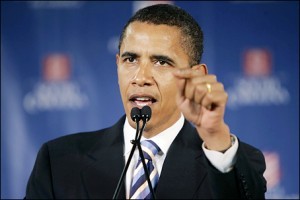Obama’s Second Term Agenda: Why Not Focus On Campaign Finance Reform?
 Ryan Lizza’s much buzzed about recent piece in The New Yorker investigates what Barack Obama might focus on in a second term. Obama could focus on immigration reform, on clean energy and the environment, on shoring up healthcare reform to future attacks from Republicans, on foreign policy. These are all issues that candidate Obama promised to work on in the 2008 election.
Ryan Lizza’s much buzzed about recent piece in The New Yorker investigates what Barack Obama might focus on in a second term. Obama could focus on immigration reform, on clean energy and the environment, on shoring up healthcare reform to future attacks from Republicans, on foreign policy. These are all issues that candidate Obama promised to work on in the 2008 election.
But Lizza’s article doesn’t mention another one of Obama’s big 2008 promises. Here he is in 2008, promising to work on getting big money out of politics:
Let me be clear — this isn’t just about ending the failed policies of the Bush years; it’s about ending the failed system in Washington that produces those policies. For far too long, through both Democratic and Republican administrations, Washington has allowed Wall Street to use lobbyists and campaign contributions to rig the system and get its way, no matter what it costs ordinary Americans.
Yet while in office, Obama has done little to follow through on these promises — instead, he has embraced the failed system, spending more time fundraising than any incumbent president in history and flouting his own rules on lobbyists and government contractors in the White House.
Yesterday, Obama advisor David Axelrod apparently backed the idea of a constitutional amendment to stop the flood of corporate money that has inundated American elections in recent years:
“The long-term implications for our government, our democracy, are very, very grave,” he said during a discussion with John Heilemann of New York magazine at the 92nd Street Y on Manhattan’s Upper East Side. “I hope that one of the things we can do, when we win this election, is use whatever tools are available, up to and including a Constitutional amendment, to turn this back.”
We should applaud any Obama efforts to reform the system he had so harshly criticized. And an amendment — which could take years to pass — isn’t even the first step. Republic Report has already listed four actions the president could take right now to start to clean up the everyday corruption plaguing Washington. He could issue an executive order mandating campaign disclosure by government contractors, strengthen the Federal Elections Commission, use the Securities and Exchange Commission to empower investors with information about corporate political spending, and press for measures to add transparency to our elections.
And he doesn’t need to work with an obstructionist Congress to do this. So, if fixing Washington is as urgent as both Obama in 2008 and Axelrod this week claimed, what’s stopping the president from working on this issue before he starts a second term?